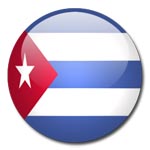Cuba conspicuously absent at Americas meeting
 Washington - Cuba is hogging the spotlight ahead of the Summit of the Americas that opens Friday in Trinidad and Tobago, particularly considering that it will not be represented at the gathering. This is to be US President Barack Obama's first major meeting with his peers from across the Americas, and many of them have adopted as their own Cuba's demand that Washington lift its embargo on the communist island.
Washington - Cuba is hogging the spotlight ahead of the Summit of the Americas that opens Friday in Trinidad and Tobago, particularly considering that it will not be represented at the gathering. This is to be US President Barack Obama's first major meeting with his peers from across the Americas, and many of them have adopted as their own Cuba's demand that Washington lift its embargo on the communist island.
As if to acknowledge this, Obama on Monday lifted all restrictions on Cuban Americans travelling and sending money back to their home country as part of a much-anticipated reversal of US policies toward Cuba.
He even surprised many by going one step further than most had expected, allowing US telecommunications companies to seek agreements to provide fiber-optic cables and satellite communications in Cuba. The White House said expanding communications within the island could help open up Cuban society.
But he did not end the trade embargo in place since the 1960s, and kept in place travel restrictions for most non-Cuban Americans. Jose Miguel Insulza, secretary general of the Organization of American States (OAS), stressed in recent days that the Cuba issue would not feature at all in the final declaration of the Summit of the Americas, whose draft is already circulating among the organization's 34 members for approval.
However, the Caribbean island - the only country of the Americas that is not a member of OAS - has been mentioned by most ahead of the continental meeting, including officials in Washington. Even US authorities have had to admit that it will be difficult to avoid the issue in Port of Spain.
Jeffrey Davidow, Obama's special advisor for the summit, has repeated time and again in recent days that it would be "unfortunate" for the Cuban issue to cast a shadow over the chance for dialogue with the new US president that the meeting offers after a years-long rift with the White House.
"It would be unfortunate to lose this opportunity (...) by getting distracted by the Cuba issue," Davidow said.
However, he admitted that it would probably "come up some way."
And not just because unconditional allies of historic Cuban leader Fidel Castro like Venezuelan President Hugo Chavez have said loud and clear that they will not miss the chance to tell Obama that he should put an end to the embargo on Cuba.
Since Cuban President Raul Castro took office last year and joined the Rio Group in December, demands for an end to the embargo on the island have become almost unanimous across Latin America.
Brazilian President Luiz Inacio Lula da Silva, who has already met with Obama twice, has been one of the main advocates for the Cuban cause, and even offered to mediate between Washington and Havana.
Moreover, Cuba has also become a growing issue within the United States, where voices that demand a new strategy in policy towards the communist country are getting louder.
"It is time to look at a new direction in our foreign policy," said US Democratic Senator Barbara Lee, who visited Cuba earlier this month and met with both Castro brothers.
In a column Sunday before the summit, The Boston Globe warned that "the United States cannot afford to maintain its embargo of Cuba or its reckless immigration policy."
"We are in an economic crisis, but excluded from a market 90 miles off our coast, while other foreign entities sign lucrative contracts," the daily complained.
"It is time we stop wasting money to enforce restrictions on US travellers and merchants; stop wasting the resources of our coast guard; stop encouraging illegal immigration with wet foot, dry foot; start protecting our environment, economy, and our borders; and begin repairing the 50 years of damage done to our relationships in Latin America by ineffective, misguided policies," it added.
Despite growing demands at home and abroad, the Obama Administration does not seem to be considering fully lifting the embargo, even in the medium term.
In recent weeks, there had been rumours that before travelling to Trinidad, Obama might announce a change in US policy towards Cuba.
While Obama did that this week, doubt remained as to whether Latin American countries would settle for such a limited move and - as Washington would like - turn all their efforts in Trinidad and Tobago away from Cuba and towards pressing issues that affect them all, like the global economic crisis. (dpa)